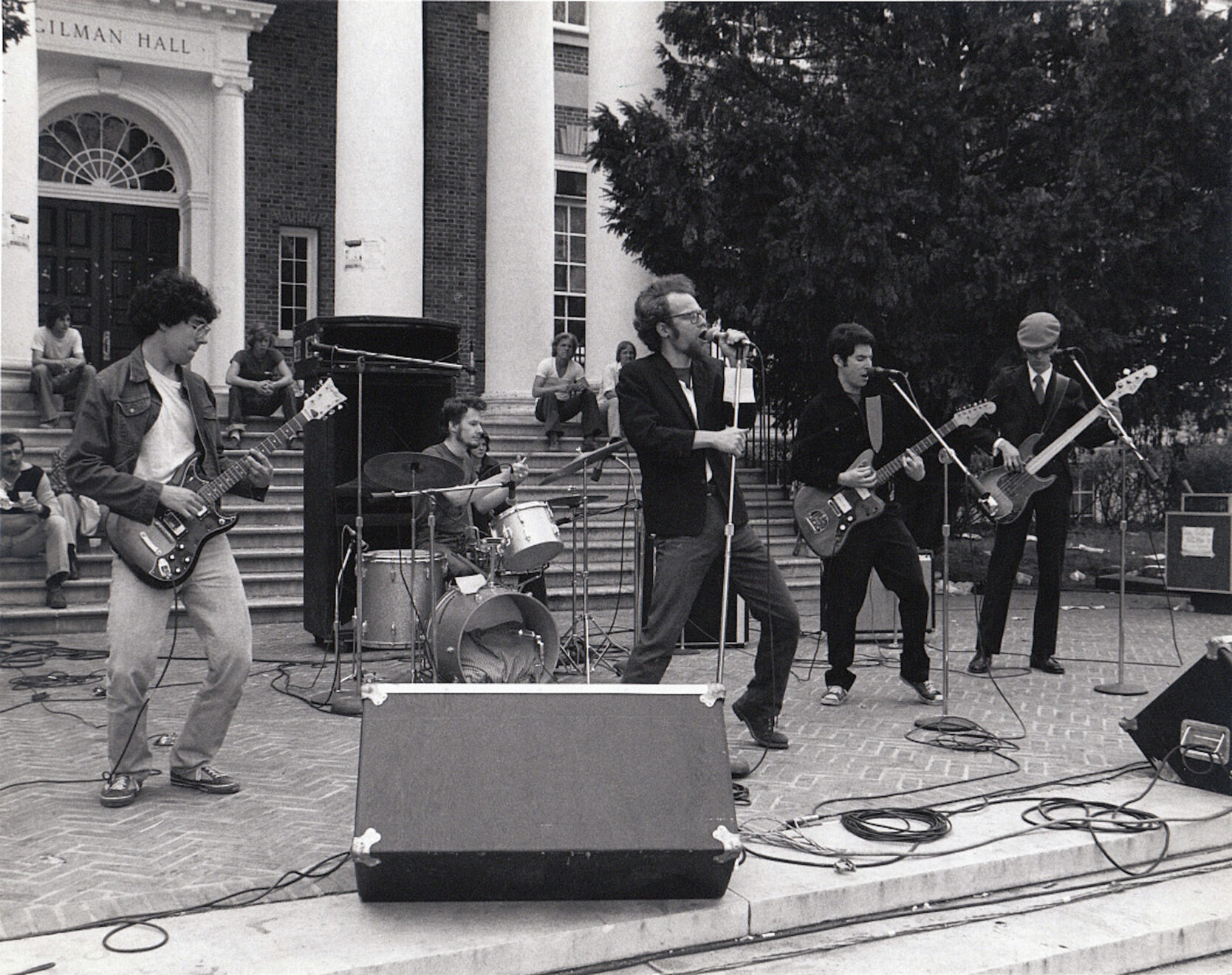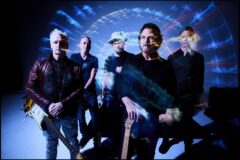My old Hotmail inbox is a perpetual wasteland of phishing scams, coupon codes, LinkedIn requests, and instantly-deleted press releases. But back in October 2021, an intriguing message peeked above the junk pile.
The singer-songwriter of a well-respected, long-running indie-rock band — let’s call him Burt — had reached out with a Bandcamp link to his latest album, weaving in an assortment of press clips, some (possibly inflated) flattery of my writing, and a request that we “keep in touch.” While I was a little confused how he got my email, particularly this old one that I mainly keep to sign up for free streaming trials, I was also impressed by his hustle — he’d clearly done his homework, and he seemed to understand my sensibility as a critic and musician. His note referenced José González, Yes, and XTC — Burt and I seemed like kindred spirits. Maybe we could be friends, or at least chummy pen pals.
I also loved his latest music — proggy, hooky, totally unique — but I knew I couldn’t cover it. The album had already been released, and the industry is stupidly obsessed with the calendar. Instead, I figured we could just chat as two human beings, not a musician eager for coverage and a writer scouring for a pitch. Since he sent over his tunes, I reciprocated, passing along links to my own obscure, home-recorded songs. I’ve always been a bit sheepish sharing my work, and I welcomed the idea of getting a professional’s feedback.
In response, he sent me a tome full of blunt, insightful comments — complimenting my guitar work and sonic ambition, criticizing my over-use of digital plugins and “in the box” synth sounds. “Would you be adverse [sic] to sending me stems of some of your tracks?” he wrote, offering to remix the material and add analog keyboards. I was so stunned, I forgot to send him the Dropbox link. Then I freaked out. As a music journalist, had I crossed some kind of blurry ethical line?
For the few of us straddling this particular fence, pursuing two passions that often threaten to compete or overlap, such dilemmas may be one click away.
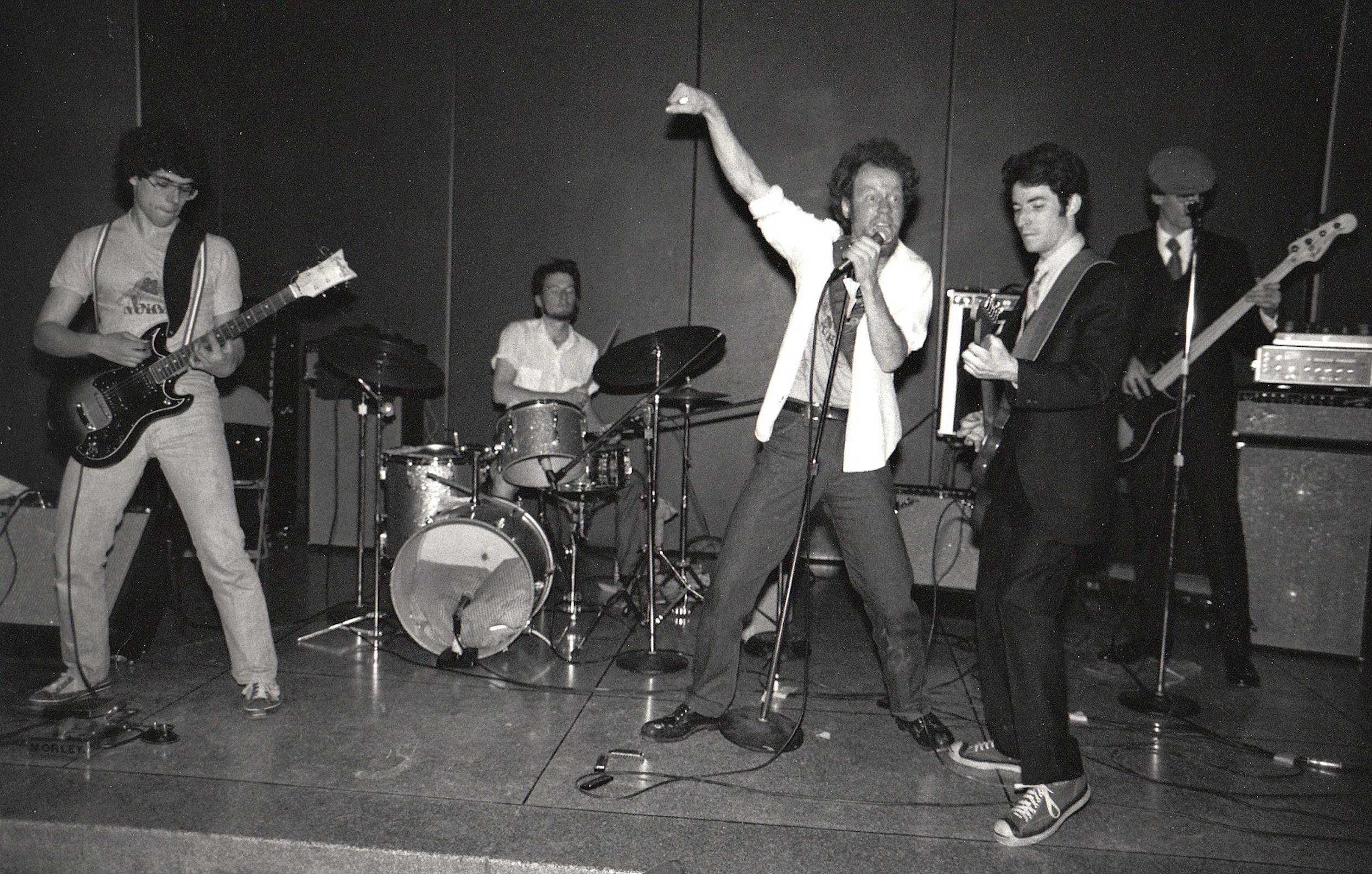
When you hear the phrase “music journalists who make music,” you might picture a coffee shop hipster cranking out lo-fi GarageBand beats between listicles — a perfectly valid way to create, but not exactly the image of someone juggling two careers. But many people relevant to this story are actually in the music industry — singers, drummers, noise-makers, label-owners, all devoted to their craft when schedules allow.
If you know J.D. Considine, it’s likely for the sharp, insightful reviews and profiles he’s been writing since 1977, including stints as a contributor for Rolling Stone and Musician, managing editor at Revolver, and, more recently, a critic for JazzTimes and DownBeat. But he’s also a multi-instrumentalist — mainly bass, but he can also play trombone, flute, a bit of trumpet and guitar — who’s just as passionate about playing.
It’s been a lifelong pursuit: J.D. was in the school band from elementary school through university, hopped around jazz groups as an undergraduate, then joined a New Wave act, The Reason, that gigged around Baltimore. “The core members later did a novelty record [under the name] Bruce Springstone,” he says. “It was a version of ‘Take Me Out to the Ball Game’ done in the style of Bruce Springsteen.”
But the music dream faded, at least temporarily, when J.D. accepted his first newspaper job at the Baltimore News-American around 1980. “They basically told me that I could continue to play in a band, but I couldn’t play with the band in any place that I would likely be writing about,” he says. “If there was a club that would be booking shows that I would be reviewing, it would be seen by the editors as a conflict if the band that I was in also played at the same club. Effectively what that meant was that I had to quit the band.”
J.D.’s tenure at the News-American lasted a year and a half, before he kindly volunteered to join a wave of lay-offs and move forward as a full-time freelancer. Without being tied to a masthead, he was free to explore music publicly again — “Daily paper journalism really restricted what you could do in terms of perceived conflict of interest” — but the few bands he played in around that time never got off the ground.
He’s been much more active in recent years. Though his frequency has been slowed by COVID restrictions in Toronto, where he’s lived for two decades, he’s performed everywhere from jazz clubs to churches to theater pit orchestras.
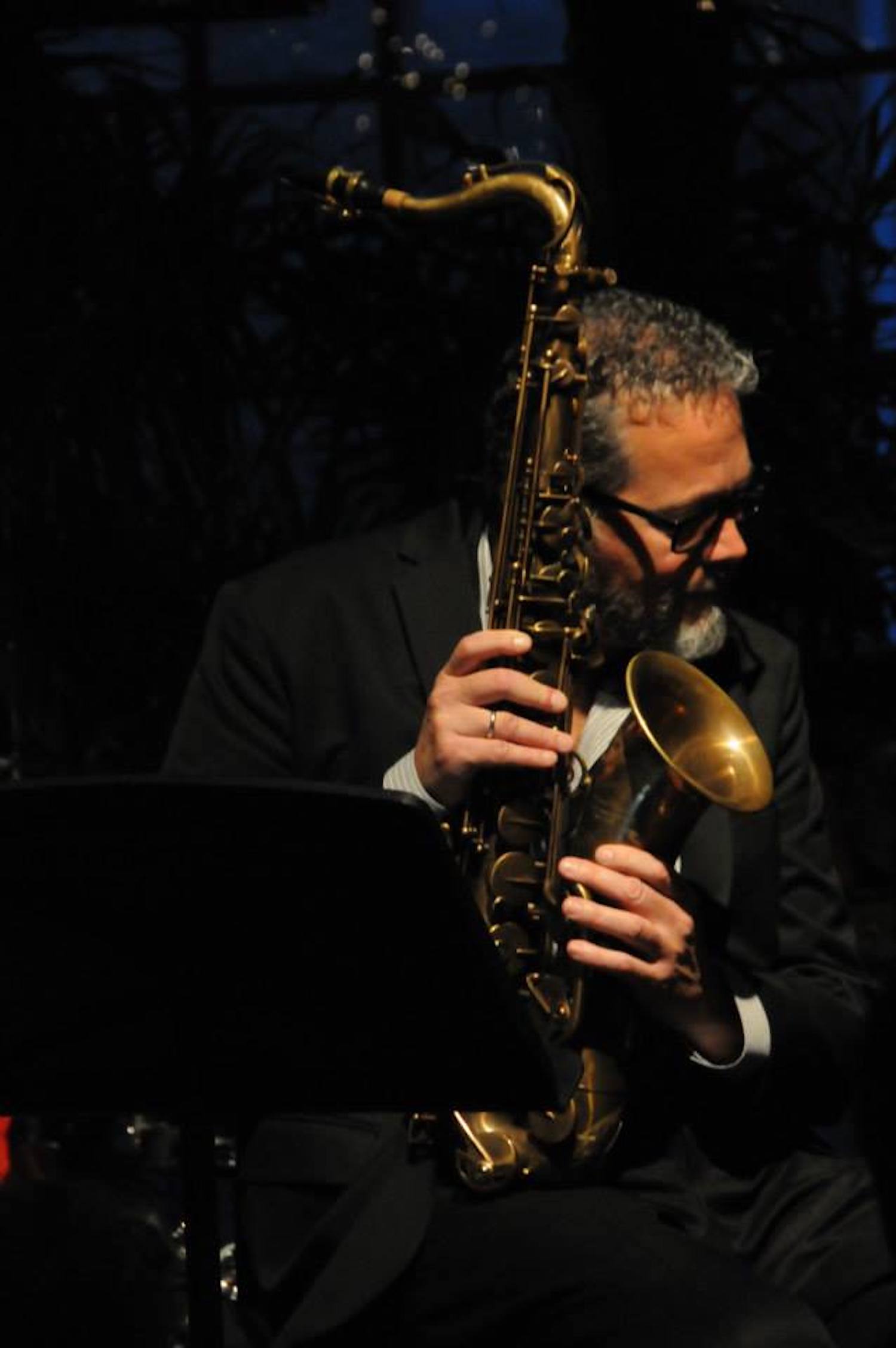
Writer and saxophonist Tom Moon is from Philadelphia, but both of his careers really blossomed in Miami — a stint that includes attending the University of Miami, where he studied music and contributed to the student newspaper. (“I could get free records!” he recalls with a chuckle.) He also performed a hilariously wide range of gigs, from touring with the Maynard Ferguson Orchestra to working weddings, cruise ships, and bar mitzvahs.
Four years after graduation, he “got lucky” when a former professor called, on behalf of the Miami Herald, asking if Tom could recommend a good jazz critic. It all fell into place, with one stipulation: “When I started to work with the Herald, I was a full-time musician,” Tom says. “And I didn’t want to give that up. They were understanding of that, and they liked it.”
Being a musician was a boon for Moon: He wound up writing a series of articles on “the various aspects of the experience of playing music” — including one light piece about the cruise gig titled “My Life as a Musician at Sea.”
“They eventually hired me as a music critic,” he says. “The understanding with the editors, pretty much all the way up the line, was that I would have to decline gigs if they were going to be conflict of interest, which didn’t usually happen. Most of the things I was covering were contemporary work. Most of the things I was playing were either salsa bands or Peter Allen and old-line entertainers. I had crazy gigs.”
In 1988, Tom replaced the “amazing” Ken Tucker as music critic at The Philadelphia Inquirer, fulfilling the publication’s desire to expand: “They wanted someone who could write a little bit about jazz, a little bit about world music.” But, “like an idiot,” he’d listed his music experience on his résumé, thinking it was a positive.
“It had, like, Tony Bennett, The 5th Dimension, all these people I played for, and these editors in Philadelphia were like, ‘Wait a minute.’ [Laughs.] They were incredibly nervous. They explained to me that if there was the appearance that I was using a position at a newspaper to get a gig, any gig, that would be bad for me and the paper, and they couldn’t have it. It was a conflict in all ways. Actually, when they offered me the job, they said, ‘It’s contingent upon you signing this amendment to the contract.’ It was this separate document that [essentially] said, ‘I will not work as a professional musician while I am the employee of The Philadelphia Inquirer.'”
These days, Tom’s back to hunting gigs — he plays in the Philly-based Ensemble Novo (inspired by the inventive Brazilian music of the ’60s and ’70s) and writes his Substack newsletter EchoLocator. It’s a more chaotic place to be, but it has its benefits.
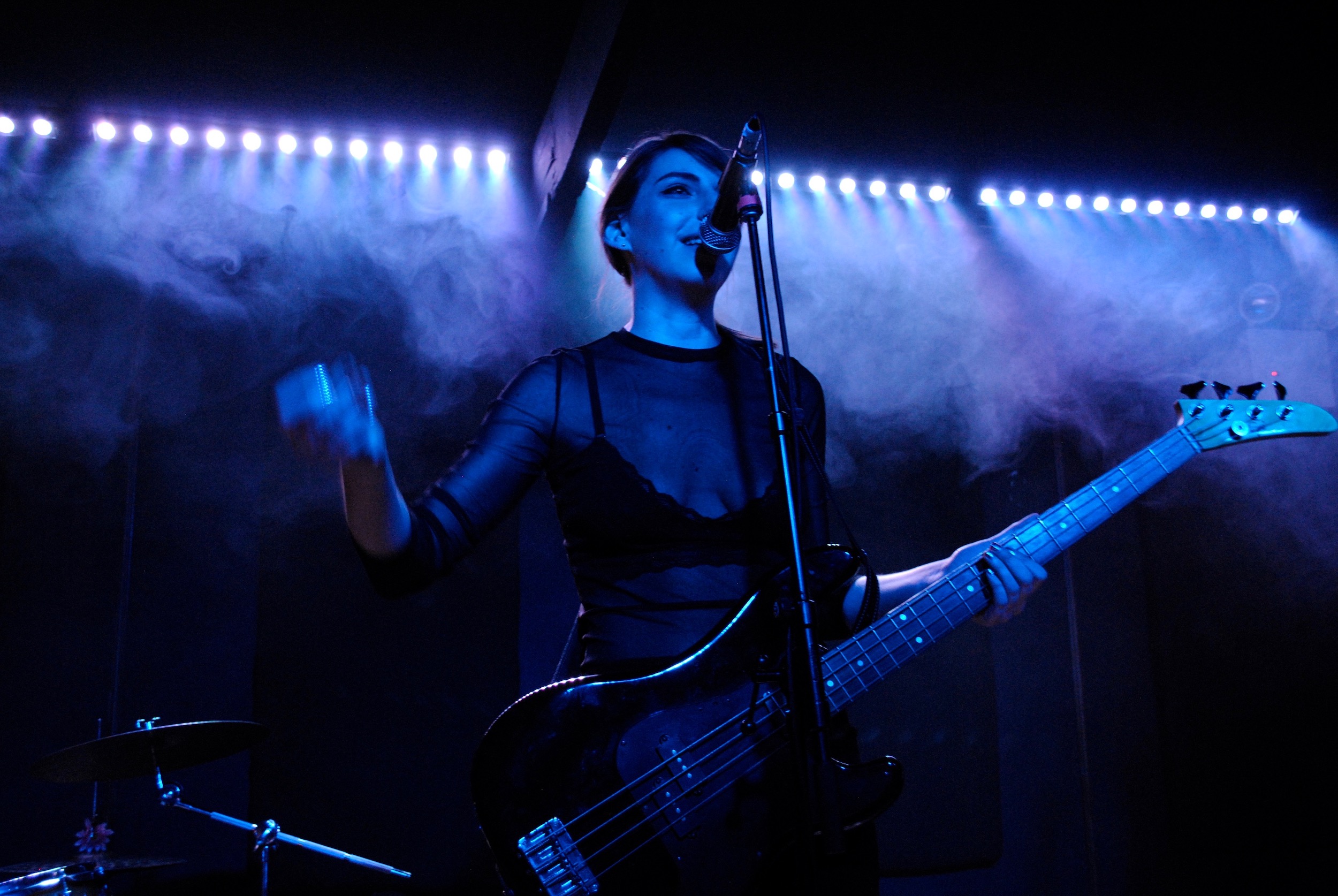
Most musician-journalists aren’t really “in it for the money” — there are only so many hours in the day, and as all know too well in the streaming age, it’s hard for even established artists to make a living from Spotify crumbs and the occasional T-shirt sale. (My all-time Bandcamp sales for solo music, dating back to 2013, total a whopping $107. Then again, I don’t tour and also have a crippling complex about promoting my stuff.) In more ways than one, removing the financial component can be creatively freeing.
Loren DiBlasi — one-third of post-punk trio Patio, whose long-delayed second LP is coming in 2023 — describes the band’s route as “choose-your-own-adventure.”
“We all have full-time jobs, so we aren’t relying on the band to make money, and we wouldn’t want it any other way,” says the bassist, who has also written for outlets like Stereogum, Vulture, and NPR Music. “Having our own money to put into the band as we see fit gives us a lot of power and control. I can’t imagine not having that.”
Loren isn’t alone in having a third path — a day job on top of the music and writing. In fact, the majority of people I interviewed for this story mentioned having another revenue stream, from government work to copywriting. For Jack Riedy (a bassist/remixer with bylines at Chicago Reader, Pitchfork, and Passion of the Weiss), separation helps preserve integrity. “I have a job in advertising that’s not related to music at all or even writing at all,” he says. “I think it’s really helped me really enjoy the other two as things I enjoy and not things I have to do to make my living.”
Some of it depends, seemingly, on how much energy they’re willing to expend — and how much frustration they’re willing to endure — by working in such finicky fields, where stable paychecks aren’t guaranteed.
“What happened to me is probably what happens to everybody,” says Raymond Cummings, a veteran critic who contributes to various publications (including SPIN and The Wire) and creates his own experimental music rooted in noise and field recordings. “As you move along in whatever version of a day job you have, it becomes, in some ways, more mentally demanding. Your energy level just goes down. Ten years ago, I was writing every night. I have a huge admiration for other people who are doing this freelance stuff full-time, which would’ve been my dream when I was a younger person. But no, I can’t.”

Drummer/writer Mia Hughes is still relatively new to the game, but they’re currently “getting by without a day job” — having, in just a few years, built up an impressive slate of clips for SPIN, Pitchfork, NME, Stereogum, and several other outlets. In another unique wrinkle, their writing and playing (including studio work and one tour with indie-rocker Cavetown) have developed a sort of symbiotic relationship: “I reviewed Lindsay [Monroe]’s EP in 2020,” Hughes says. “We followed each other on social media, and from there she became familiar with my drumming work and asked me to drum for her in 2021.”
It’s the rare situation where an employment relationship between writer and musician seems cut and dry: Journalist writes about songs, artist reaches out with an offer, relationship organically forms. No bullshit to decode.
But in other scenarios, there are shades of gray: Let’s say a music journalist has a new album coming out, and they want to generate hype — surely there’s no harm in sending the music out to friends, even if they’re also writers. But when should you recuse yourself from covering a project?
Mia always aims to avoid these queasy quandaries: “Ethics are important to me,” she says. “Crossing the boundaries between musician me and journalist me is definitely a concern, and I won’t cover artists if I know them personally/have toured with them. Sometimes that’s a bummer if I think an artist I know personally is objectively really great, but that’s a line I don’t cross.”
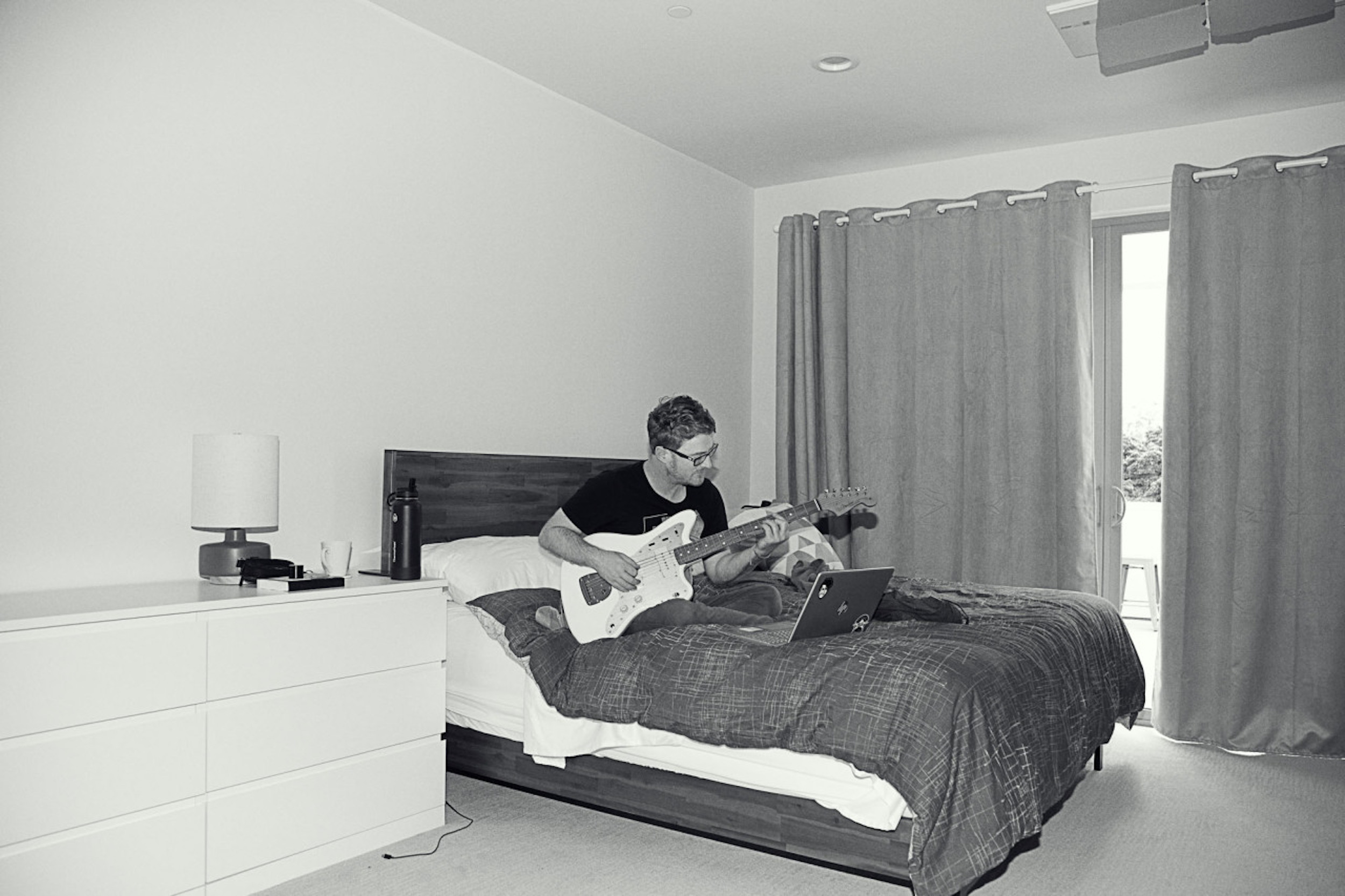
It can also be uncomfortable — in a very literal, practical way — trying to do both of these jobs at the same time. Just ask Mike Huguenor, the A&E Editor at San Jose weekly Metro Silicon Valley and guitarist for indie-rock band Shinobu and punk acts Hard Girls and Jeff Rosenstock. (He also released the guitar-only solo album X’ed, in 2020.) In one of the most insane/impressive feats of music journalist multi-tasking I’ve ever heard, he went on tour with Rosenstock in 2021 while continuing to fulfill his daily obligations at the paper.
“I told the owner I could take [the editor job] on the condition that I’m still a touring musician and need to be able to do that,” he says. “We did this big tour in November and December, like six weeks, where I was editing the section on the road, doing it sometimes in the car. I bought a wireless router to try and do it in the van in between stuff. I was editing during soundcheck and shit. It was a lot.”
“There were weeks that went pretty smoothly, but there was a week or two where I woke up in a panic, stressed immediately,” he continues. “Luckily those days were on the East Coast, so I was three hours ahead of everybody over here. We’d have to get in the van at 10, and hopefully we were somewhere — the brick I got for WiFi says it works in 140 countries, but… it doesn’t work in Wyoming! [Laughs.]”
The “ritual” of performance — including pre-gig push-ups, stretching, and vocal warmups — helped Mike get used to the grind. But that doesn’t mean he didn’t end up literally editing concert previews onstage. Because, yeah, that totally happened.
“There was a time when I brought my computer up onstage and was [working] during soundcheck,” he says. “But there are so many instruments in the Jeff band. Checking the drums may take 25-30 minutes. When it’s my turn to soundcheck, I close the computer and get into it. That’s as close as it would come.”
After dropping the ball on Burt, I settled back into my routine: critic by day, one-man-bedroom-band by night. I also asked around to recruit a professional mixing engineer — one I intended to pay for. He sent a couple more follow-ups, updating me on his album’s promotional tour and minor chart success — and while I silently wished him well from afar, I felt too weird and conflicted to even reply.
Was I being used? Was I just paranoid?
Weeks later, the mailman dropped off a curious package containing a promo CD, a coffee mug, and a handwritten note. “Hey!” it read in part. “Keep in touch!”

